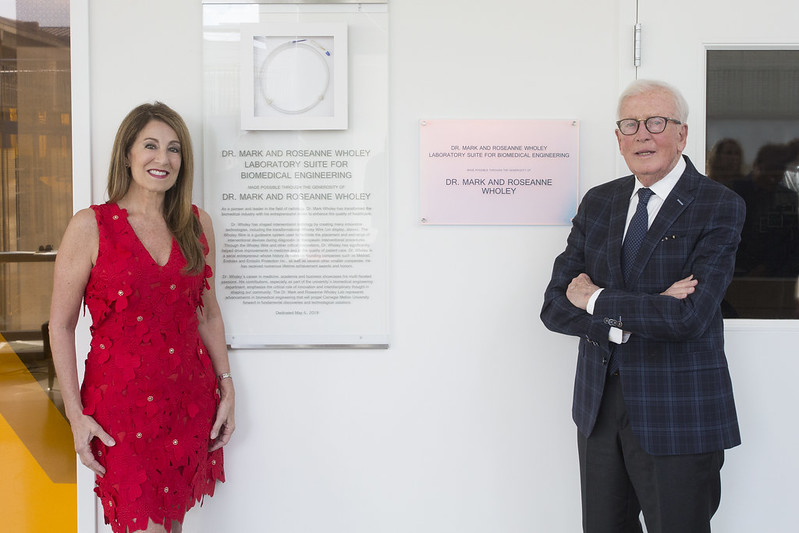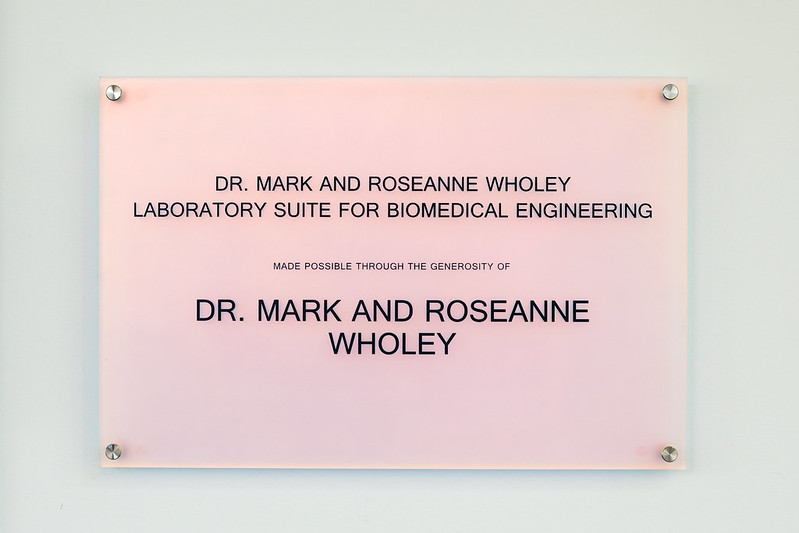
Remembering Mark Wholey
By Sara Pecchia
Medical pioneer, entrepreneur, and educator Mark Wholey, M.D., passed away on February 25, 2025, leaving behind a strong legacy of innovation and generosity.
A native of Pittsburgh, Dr. Wholey had strong connections to the Allegheny Health Network, the University of Pittsburgh School of Medicine, and notably, Carnegie Mellon University (CMU), where he served as an adjunct faculty member. He hailed from the Wholey family, which has operated an iconic fish market in Pittsburgh for over 100 years, however, pursued a medical career, graduating from the University of Pittsburgh and receiving his medical degree in 1953 from Hahnemann Medical College in Philadelphia.
Following graduation, Dr. Wholey trained at Case Western Reserve University and the Mayo Clinic before earning an NIH-sponsored fellowship in neuroradiology and cardiovascular radiology in Lund, Sweden. It was there that he learned cutting-edge angiography and catheter skills, which he brought back to Pittsburgh's Shadyside Hospital. He went on to establish an interventional radiology practice and served as chairman of the hospital’s Department of Radiology and director of cardiovascular and interventional radiology. Distinctively, he was also a founding member of the Society for Interventional Radiology (SIR) and recognized with the SIR Gold Medal award in 2008.
Dr. Wholey played a key role in shaping interventional radiology by developing groundbreaking technologies throughout his life. While working at Shadyside Hospital, he co-founded Medrad and developed the portable angiographic injector, which became the universal injection system for all angiograms performed in the U.S. and much of the world. Other innovative devices and advances concerning the carotid system soon followed.
Partnerships with CMU engineers strengthened Dr. Wholey’s collaborative muscles, and these research endeavors yielded many transformative technologies, including the Wholey series of controllable and steerable guide wires, as well as balloons, stents, stent grafts, and a filter wire for carotid distal protection. One notable collaborator was Lee Weiss, a founding member of CMU’s Robotics Institute. Lee and Mark were long-time friends and fellow collaborators on numerous research and entrepreneurial projects for almost 40 years.
“There was nothing Mark loved more than talking about new cardiology technologies and working with engineers to bring them to life,” remembered Keith Cook, department head and professor of biomedical engineering.
Extensive entrepreneurial and clinical experience positioned Dr. Wholey as a valuable resource for CMU faculty looking to translate their developing biomedical technologies.
"Mark’s enthusiasm and energy were infectious," noted Phil Campbell, research professor of biomedical engineering and the Engineering Research Accelerator. "If he didn't know something offhand, he could refer you to someone who did. While he was always eager to discuss potential entrepreneurial ideas, after your pitch, he often brought you back to reality. Nonetheless, he always asserted it was in your best interest, leveraging his breadth of biomedical and entrepreneurial knowledge, and he conveyed it with an honest smile."
"Every once in a while, he would offer you a thumbs up," continued Campbell. "This was the case with CarMel Therapeutics, founded by Lee Weiss and me in 2007. Not only did Mark endorse the technology for creating bioactive bioplastics from human plasma, but he also served as one of the initial members of the company’s board."
Dr. Wholey was also actively involved in student mentoring, regularly going above and beyond to sponsor projects for the department’s Capstone Design course sequence, among other student engagement efforts. His collaboration with former CMU Ph.D. student Gail Siewiorek and her advisor, Endor Finol, in researching the fluid dynamics of blood flow in embolic protection filters, serves as a strong example of this.
“Mark was a really great collaborator during my time at CMU,” expressed Siewiorek, a former biomedical engineering Ph.D. student. “His experience in interventional radiology was unparalleled, and he was unselfish about his knowledge. Learning how to communicate engineering concepts to someone with a clinical background and taking clinical input into experimental design set me up well for some of the skills that I need in the medical device industry.”
A decades-long involvement with biomedical research at CMU continues to this day. In 2019, Mark and his wife, Rosanne, made a multi-million-dollar gift to CMU to support advancements in biomedical engineering research. Their contribution named the department’s prominent laboratory suite the Dr. Mark and Roseanne Wholey Laboratory Suite for Biomedical Engineering.

“Mark has been one of CMU Biomedical Engineering’s most ardent supporters,” punctuated Cook. “We will miss his engagement, enthusiasm, and collaborative spirit.”
Pictured, top: Dr. Mark Wholey with his wife, Roseanne Wholey, during the opening of the Dr. Mark Wholey and Roseanne Wholey Laboratory Suite for Biomedical Engineering in 2019.